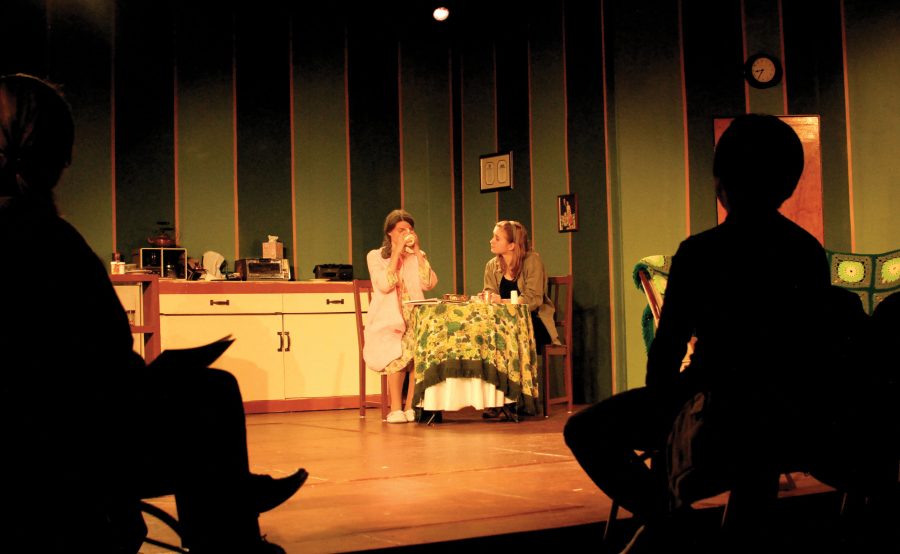Every January the Spotlight Players return to campus a week earlier than most of us to prepare for their annual show. This particular theater group selects a play that addresses a social issue and donates all proceeds from the play to charity. This year, they chose to highlight the issue of suicide in Night, Mother, directed by Spotlight Players President Rachel Fraczkowski and sponsored by CCSJ.
Senior Melanie Megale played Thelma Cates (Mama) and freshman Alex Chouinard played her daughter, Jessie Cates. These were the only two characters in the play. For one hour and 20 minutes, these two women were charged with the daunting task of carrying an entire production while portraying two intense, emotional and complicated characters.
The play opens with Jessie informing her mother of her plan to commit suicide as she goes about their normal Saturday night routine of cleaning and preparing to give her mother a manicure. Her mother tries to convince her not to follow through with it as Jessie explains her reasoning and tries to help her mother accept it.
This subject matter requires a delicate touch in order to convey the complexity of the emotions covered in the show. Alex Chouinard may be a newcomer to the Loyola stage but she managed to convey a sadness well beyond her years. Her character struggled with epilepsy, a troubled son and a lost husband, things that Chouinard most likely has little personal experience with but she became that character. Jessie’s struggles became her own as she walked her mother through the stages of grief on the stage. There are definitely other great Loyola performances in store for Chouinard.
Melanie Megale entered the stage with the lights still up and simply sat eating a doughnut and reading the paper. As the lights were eased down, she went from a senior with fake gray hair to a mother. She experienced denial, anger, bargaining, depression and acceptance of the inevitable on the stage. Due to the intimate space, the audience was able to feel all of these emotions with her. The final scene where Mama is banging on the door literally trying everything possible to convince her daughter not to pull the trigger was heart wrenching. She crumbled on stage, bawling her eyes out and causing several audience members to cry along with her. It was truly impressive how she became that character.
Blackbox performances allow a sense of intimacy that does not exist in other performance venues. The theater had three rows lined up on two different walls creating an L shape of seating around the set. This seating made the audience feel as if they were actually guests in the kitchen. The set was simple: a kitchen with a table, a couch, a phone table and two doors at the back of the stage. It was only a room in the characters’ home but it proved to be the center of their relationship.
The lighting and sound were critical. As the show progressed, the lighting became dimmer. The final scene featured one door, the clock showing it was not even 10 p.m. and the telephone all housed in a spotlight to show the path Mama took after her emotional breakdown at the door. As people entered and exited, music of the time period played helping to bring the audience into the show.
The director’s note made one plea, “All I ask is that you let yourself be moved, as I have been.” Judging from the amount of tears being wiped away as the lights came up, it seems as if this plea was answered. This show manages not only to tell an important story but donated money to an important cause.
All proceeds went to a partner of CCSJ, the Caroline Center, an organization that has provided education and career skills training to Baltimore City women since 1996. According to information provided after the performance, “Every Caroline Center graduate is a “member for life,” which means she can use all of their resources for the rest of her life.
Before the show began, Emily Deanvey, Rebecca Heeman and Chemine Sharpe dressed in all black with one pop of color and recited poems from the Caroline Center‘s new publication, What It Takes. Audience members were amongst the first people to hear these personal stories from the women of the Caroline Center. Friday’s show ended with a panel discussion about the themes and issues of the show. The panel included Sister Pat McLaughlin, the executive director of the Caroline Center, and Loyola faculty members.
The next Loyola theatrical production is the spring musical, Cabaret, on February 20-22 in the McManus Theater.













































































































